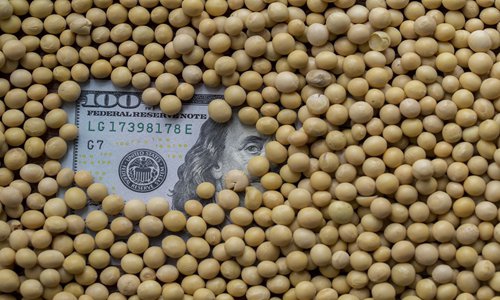SOURCE / INDUSTRIES
Coronavirus outbreak in US may delay China's soybean purchase
Virus outbreak in US casts shadow on trade pact

File photo
China's massive purchases of US soybeans are likely to be put off to the second half of the year due to high US soybean prices and weakening demand in China resulting from the coronavirus outbreak. Based on the terms of the phase-one trade deal, China will buy $32 billion worth of agricultural products over two years.A person close to Lianyungang port in Jiangsu Province told the Global Times that the port has not seen soybean shipments from the US yet, only those from Brazil and Argentina. The person disclosed that volumes from Brazil and Argentina remained at about the same level of last year.
"The elevating price of US soybeans compared with Brazil and Argentina is one of the reasons keeping Chinese buyers from buying from the US now," Li Guoxiang, a research fellow at the Chinese Academy of Social Sciences, told the Global Times on Thursday.
For April shipments, Brazilian beans to China sell at $382 a ton, while US soybeans price is $395 per ton, said a Reuters report.
Li noted that the higher US price could be "intentional" as US exporters may assume that after the trade deal, the Chinese government will "guide importers" to buy US farm products regardless of the prices.
Li said that soybean purchases are totally market-driven in China now, and only when the price of US soybeans gains an edge, will large purchases occur.
US Agriculture Secretary Sonny Perdue predicted China will come to the US market for soybeans in late spring and summer, according to a Reuters report on March 7.
However, Jiao Shanwei, editor-in-chief of cngrain.com, a website specializing in grain news, predicted that large-scale purchases are unlikely to happen during the first half year, given declining domestic soybean demand due to the virus outbreak.
On February 18, China announced that 696 items imported from the US will be exempt from punitive tariffs for one year, including pork and soybeans, paving the way for more purchases of US agricultural products.
Based on the term, some Chinese companies have started to apply for tariff exemptions to import US soybeans, and some have won approval, insiders told the Global Times on Thursday.
"However, [the applications] are more like a goodwill gesture that shows the country is indeed carrying out its commitment, large purchases will only happen when demand rises and the price is reasonable," Jiao told the Global Times on Thursday.
"Chinese feed consumption is continuing to decline. The poultry industry was hit hard by the virus, restaurants and schools have not restored normalcy, and hog production has not recovered from the African swine fever yet," Jiao said. He predicted even during the second half, demand may not rebound aggressively.
A spreading COVID-19 pandemic in the US also fueled worries among Chinese importers that the virus could dampen shipments to China, casting a shadow over the implementation of the trade deal.
As of Thursday, more than 1,200 people had tested positive for coronavirus across the US, and the death toll rose to 38.
However, a rapidly spreading virus outbreak many not dampen US soybean production, due to high mechanization of US farms, but the potential impact on logistics and ports may affect its ability to transport soybeans to China, Li said.
From September 2020 to August 2021, US soybean output is expected to grow by 18 percent year-on-year, according to the US Department of Agriculture.



